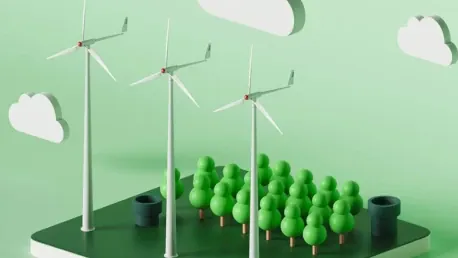The recent election results have triggered a wave of anxiety and uncertainty in the renewable energy sector, with many investors fearing the potential policy changes that could arise under a Trump administration. These fears have manifested in a sharp decline in renewable energy stocks, as market participants brace for the possible disruptions that might undermine the competitiveness of clean energy. This volatility underscores the deep-seated concerns over how future policies could impact the sustainability and growth of renewable energy initiatives across the United States.
Immediate Market Reactions
Stock Performance and Market Anxiety
Renewable energy companies saw their stocks plummet dramatically immediately after the election results were announced, signaling a profound shift in investor sentiment and market dynamics. For instance, NextEra Energy suffered a significant setback, with its stock dropping 5.25%, while Sunnova Energy faced an even harsher blow, plunging over 51%. Analysts attribute this steep decline to an overreaction prompted by election results, which evoked fears of potential policy reversals or new regulatory hurdles under the Trump administration. There are widespread concerns that the rollback of supportive policies could raise development costs and subsequently affect company valuations.
The potential changes under a Trump administration, such as repealing the Inflation Reduction Act or imposing additional tariffs on imported solar panels and steel, are at the heart of these market jitters. These actions would likely increase the development costs for renewable energy projects, making them less attractive to investors. Such policy shifts not only threaten to introduce significant financial strain on companies but also risk deterring much-needed investments in the sector. With supply chain issues already pressing on the industry, the introduction of new tariffs could exacerbate these challenges further, leading to higher operational costs and project delays.
Analysts’ Perspectives and Investor Behavior
Raj Prabhu of Mercom Capital Group outlined the possible repeal of the Inflation Reduction Act as a major concern for the renewable energy market. However, he also noted that this scenario remains unlikely due to the potential backlash from key Trump supporters who may benefit from the act. This uncertainty is driving investor behavior and further influencing stock market trends. Such a speculative environment creates a barrier to clear decision-making as stakeholders try to navigate the murky waters of policy unpredictability and market sentiment swings.
Becky Diffen of Norton Rose Fulbright highlighted another critical issue: meeting the growing U.S. demand for renewable energy projects in the face of significant tariffs. Given that domestic manufacturing capacity is currently insufficient to meet this demand, introducing steep tariffs could cripple the industry’s progress. Investors and developers might rush to finalize agreements before any major policy changes take effect. However, this could lead to an artificial surge in deal activities pre-inauguration, followed by potential stagnation as the administration’s policies begin to unfold.
Long-Term Outlook and Market Adaptation
Near-Term Market Stagnation and Deal Slowdown
Despite the immediate market volatility, some analysts predict a swift recovery for certain stocks like Sunnova Energy and First Solar, which experienced early gains post-election. Both Prabhu and Kevin Kang of Enverus Intelligence Research predict a near-term market stagnation, driven largely by the uncertainty surrounding future policies. This could result in a slowdown of renewable energy deals as investors adopt a “wait-and-see” approach. The looming policy changes cast a long shadow over the market, potentially deterring new investments until clearer indications of the administration’s stance on renewable energy emerge.
However, a reduction in policy support might have a silver lining by clearing up interconnection queues, which are essential for project timelines. The anticipated easing of bureaucratic bottlenecks could benefit project timelines and streamline processes, thus providing a short-term boost to project completions. Moreover, the expectation of ongoing interest rate cuts could help stabilize power purchase agreement (PPA) prices, indirectly supporting the renewable energy market despite other adversities. If the market can adapt swiftly to these changes, the sector could recover and continue its growth trajectory.
Ongoing Demand Growth and Broader Economic Trends
The recent election results have stirred a wave of anxiety and uncertainty in the renewable energy sector. Many investors are deeply concerned about potential policy shifts that could emerge under a Trump administration, heightening fears about the future of clean energy initiatives. This apprehension has led to a significant drop in renewable energy stocks, as market participants anticipate possible disruptions that could hinder the competitiveness and growth of the sector. The volatility in the market highlights the pervasive worries about how future policies might affect the sustainability and development of renewable energy projects across the United States. There is a palpable sense of unpredictability, as industry stakeholders brace for changes that could potentially alter the trajectory of green energy efforts. This situation underscores the complexities and challenges that the renewable energy sector faces in light of political shifts, reflecting broader concerns about the commitment to environmental policies and the long-term viability of clean energy advancements in the country.









